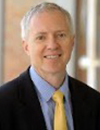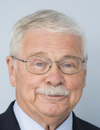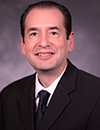Martyn BoutelleProfessor of Biomedical Sensors Engineering, Imperial College London Martyn Boutelle is Professor of Biomedical Sensors Engineering in the Department of Bioengineering, Imperial College London, and Associate Provost for Estates Planning for Imperial College. |
Brian CunninghamProfessor and Intel Alumni Endowed Chair, University of Illinois at Urbana-Champaign Prof. Cunningham has been a faculty member in the department of Electrical and Computer Engineering and the department Bioengineering at the University of Illinois at Urbana-Champaign since 2004, following a 15-year career in Industry. Prof. Cunningham’s technical focus is the utilization of photonics for biosensing in applications that include life science research, diagnostics, environmental monitoring, and pharmaceutical screening. He has over 90 issued US patents and over 200 peer reviewed journal publications. He is a Fellow of NAI, IEEE, Optica, RSC, AAAS, and AIMBE. He serves as the Director of the Center for Genomic Diagnostics at the Woese Institute for Genomic Biology, and as a Program Leader for the Cancer Center at Illinois on the topic of Cancer Measurement Technology and Data Science. In 2023, his technical contributions were recognized by Optica by the Michael S. Feld Biophotonics Award. |
Michael HellerProfessor, Dept Bioengineering, University of California-San Diego Michael J. Heller received his PhD in Biochemistry from Colorado State University in 1973. He was an NIH Postdoctoral Fellow at Northwestern University from 1973 to 1976. From 1976 to 1984 he was supervisor of the DNA Technology Group at Amoco Corporation (Standard Oil Indiana) During that time he carried out early bioengineering and recombinant DNA work on plants, algae and photosynthetic bacteria for energy and chemical production, and developed some of the first fluorescent resonant energy transfer (FRET) and chemiluminescent oligonucleotide probes for DNA hybridization analysis. He also oversaw Amoco’s sponsored energy and chemical research work at Cetus Corporation, which included the cloning of thermophilic enzymes. Dr. Heller was the Director of Molecular Biology at Molecular Biosystems, Inc., from 1984 to 1987. He was a co-founder of Integrated DNA Technologies, and served as President and Chief Operating Officer from 1987 to 1989. He was a co-found of Nanogen and served as the Chief Technical Officer from 1993 to 2001. Nanogen carried out the successful development and commercialization of electronic DNA microarray technology for clinical diagnostic genotyping applications. Dr. Heller is a Professor (Recall/Emeritus) in the Departments of Nanoengineering and Bioengineering at the University California San Diego. He is also now a Distinguished Scientist at the Oregon Health & Science University (OHSU), Center for Cancer Early Detection and Research (CEDAR), in Portland, Oregon. He has also co-founded a company called Biological Dynamics which is developing new sample to answer cancer diagnostics technology, based on the novel dielectrophoretic (DEP) technology developed at his UCSD lab. Dr. Heller has extensive industrial experience in biotechnology, biomedical and molecular diagnostic devices and nanotechnology, with particular expertise in the areas of DNA probe diagnostics, electrokinetic lab-on-a-chip devices, DNA synthesis, FRET/fluorescent-based detection technologies and electric field assisted self-assembly of DNA nanostructures. Dr. Heller has over 100 publications and 56 issued US patents. |
Victor UgazProfessor & Interim Department Head, Texas A&M University Victor M. Ugaz is a Professor and Interim Department Head in the Artie McFerrin Department of Chemical Engineering at Texas A&M University. He holds the title of Carolyn S. & Tommie E. Lohman '59 Professor in Engineering Education and serves as Chair of the interdisciplinary Master of Biotechnology (MBIOT) program. Dr. Ugaz’s research interests involve developing microfluidic systems to enable fast and inexpensive medical diagnostics and to understand the spontaneous organization of chemical building blocks essential to the origin of life. |




